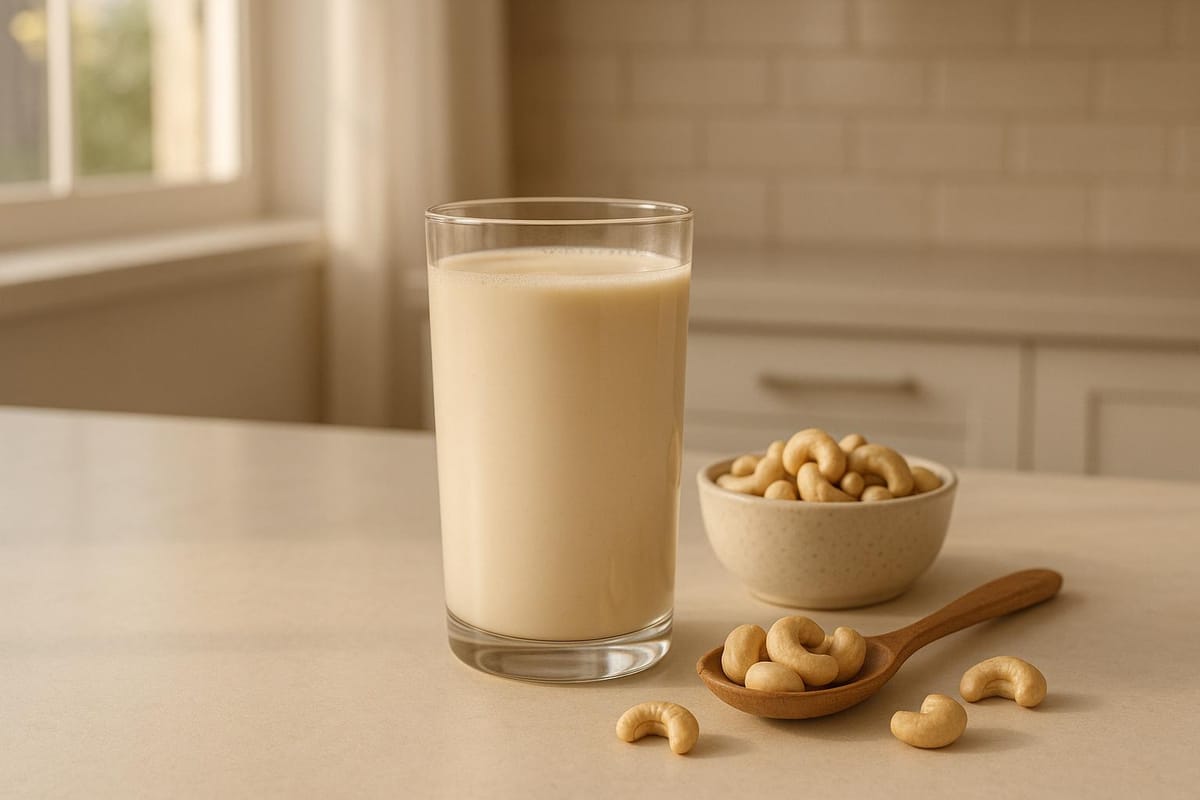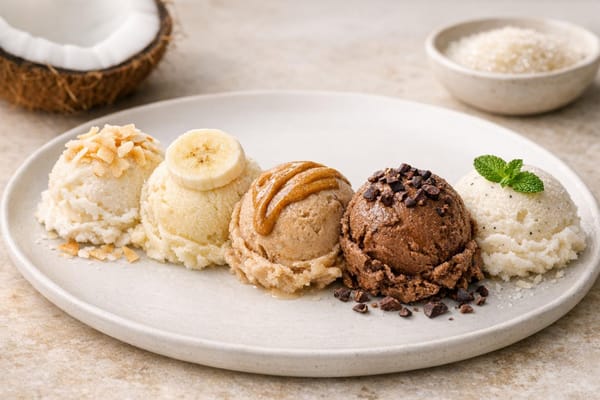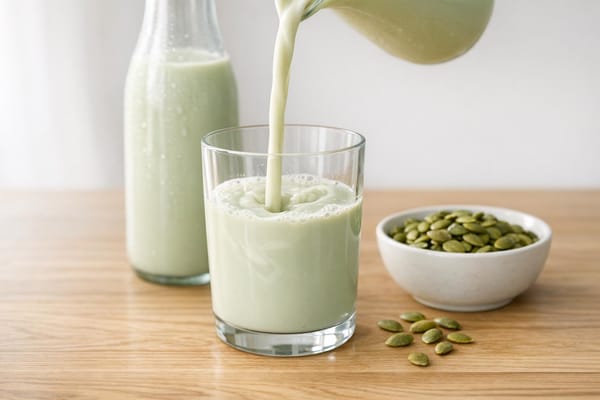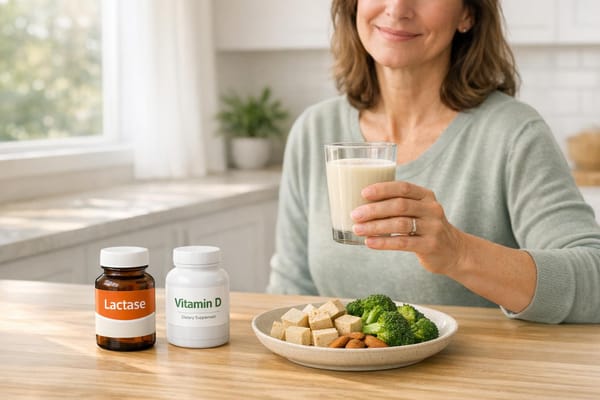Cashew Milk Nutrition Facts and Uses
Explore the nutritional benefits, uses, and comparisons of homemade and store-bought cashew milk in this comprehensive guide.

Cashew milk is a creamy, dairy-free alternative to cow's milk, perfect for those who are lactose intolerant or follow plant-based diets. Here's what you need to know:
- Low-Calorie Option: Unsweetened store-bought cashew milk has just 25 calories per cup, compared to 150 calories in whole cow's milk.
- Nutritional Benefits: It's rich in healthy fats and often fortified with calcium, vitamin D, and vitamin A, making it comparable to dairy milk in terms of essential nutrients.
- Homemade vs. Store-Bought: Homemade cashew milk is richer with 152 calories, 4g protein, and 12g fat per cup, while store-bought options are lighter but fortified for added nutrients.
- Versatility: Use it in baking, cooking, or as a creamy addition to coffee, smoothies, and soups.
- Lactose-Free Solution: Naturally lactose-free, it's a great choice for those with dairy sensitivities.
Quick Comparison Table
| Milk Type | Calories | Protein (g) | Fat (g) | Carbs (g) | Calcium (mg) | Vitamin D (% DV) |
|---|---|---|---|---|---|---|
| Homemade Cashew Milk | 152 | 4 | 12 | 8 | 11 | 0 |
| Store-Bought Cashew Milk | 25 | <1 | 2 | 1 | 450 | 10–25 |
| Unsweetened Almond Milk | 37 | 1 | 2 | 3 | Varies | Varies |
| Unsweetened Oat Milk | 60 | 1 | 3 | 7 | Varies | Varies |
Whether you choose homemade for its richness or store-bought for convenience, cashew milk is a versatile, nutritious option for your dairy-free lifestyle.
Cashew Milk | Everything You Need To Know About 🥜🥜🥜
Cashew Milk Nutrition Facts
Cashew milk has a lot going for it, and its nutritional profile is another reason why many people are adding it to their diets. Whether you prefer homemade or store-bought, each type offers its own set of benefits. Let’s break it down.
Calories, Protein, Fats, and Carbs
The nutritional makeup of cashew milk can vary quite a bit depending on whether you make it at home or buy it from the store. Store-bought versions are typically lower in calories because they’re filtered and diluted with water.
For example, unsweetened store-bought cashew milk contains roughly:
- 25 calories
- Less than 1 gram of protein
- 2 grams of fat
- 1 gram of carbohydrates per cup.
On the other hand, homemade cashew milk is richer and more calorie-dense, providing:
- 152 calories
- 4 grams of protein
- 12 grams of fat
- 8 grams of carbohydrates per cup.
If you’re watching your calorie intake, store-bought cashew milk is a lighter option compared to other plant-based choices. For instance, unsweetened almond milk has about 37 calories per cup, and unsweetened oat milk comes in at around 60 calories per cup. However, like most plant-based milks, cashew milk doesn’t pack as much protein as dairy milk.
Here’s a quick comparison of the nutritional stats:
| Milk Type | Calories | Protein (g) | Fat (g) | Carbs (g) |
|---|---|---|---|---|
| Homemade Cashew Milk (1 cup) | 152 | 4 | 12 | 8 |
| Store-bought Cashew Milk (1 cup) | 25 | <1 | 2 | 1 |
| Unsweetened Almond Milk (1 cup) | 37 | 1 | 2 | 3 |
| Unsweetened Oat Milk (1 cup) | 60 | 1 | 3 | 7 |
While the protein content is lower than dairy milk, the low-calorie nature of unsweetened store-bought cashew milk makes it a popular choice for those focused on weight management.
Now, let’s take a closer look at the vitamins and minerals it provides.
Vitamins and Minerals
When it comes to vitamins and minerals, homemade and store-bought cashew milk are quite different. Commercial cashew milk is typically fortified with nutrients like vitamin A, vitamin D, and calcium, which boosts its overall nutritional value.
For instance, store-bought cashew milk often contains about 450 mg of calcium per cup, compared to just 11 mg in homemade versions. Many brands also include 10-45% of the daily value for calcium and 10-25% of the daily value for vitamin D. Some even surpass dairy milk in calcium content.
Homemade cashew milk, while lacking these fortifications, naturally provides:
- 66 mg of magnesium
- 0.6 mg of copper
These minerals are essential for bone strength and immune health. It also contains about 0.3 mg of vitamin E, though commercial versions often have more due to added nutrients.
Certain brands take it a step further. For example, Elmhurst’s cashew milk offers 6% of the daily recommended iron intake, which can be especially helpful for those on plant-based diets.
The fortification process in store-bought cashew milk helps close the nutritional gap between plant-based and dairy milk. However, it’s worth noting that only soy milk offers a protein content comparable to cow’s milk.
How to Make Cashew Milk at Home
Making cashew milk at home is a simple way to customize both flavor and texture. While the active prep time is minimal, you’ll need to plan ahead for soaking the cashews.
What You Need
Creating homemade cashew milk doesn’t require much - just a few basic ingredients and some common kitchen tools.
Essential Ingredients:
- 1 cup raw cashews (the base of your milk)
- 4–7 cups water (use 4 cups for a creamier consistency or up to 7 cups for a lighter texture)
Optional Add-Ins for Flavor:
- Sweeteners: maple syrup, honey, agave, or dates
- Vanilla extract (about 2 teaspoons)
- A pinch of sea salt
- Spices like cinnamon or cocoa powder
- Fresh fruit, such as strawberries, for a fruity twist
Equipment:
- A blender
- A storage container with a lid (glass jars or milk jugs work well)
- Fine-mesh strainer or cheesecloth
- Small pot (for a quick hot water soak, if needed)
Simple Cashew Milk Recipe
Once you’ve gathered everything, follow these steps to whip up your cashew milk.
Step 1: Soak the Cashews.
Soaking is key for smooth, creamy milk. Ideally, soak the cashews overnight in water at room temperature or in the fridge. If you’re in a rush, pour boiling water over the cashews and let them sit for 15–30 minutes.
Step 2: Drain and Rinse.
After soaking, drain the cashews and rinse them thoroughly under cold water to remove any residue.
Step 3: Blend Everything.
Combine the soaked cashews with 4 cups of fresh water in your blender. If you’re adding sweeteners or vanilla, toss those in now. Blend on high for 60–90 seconds until smooth.
"Cashew milk is the creamiest of homemade nut milks and the most refreshing, in my opinion", says Kathryne Taylor from Cookie and Kate.
Step 4: Strain (Optional).
If you’re using a high-powered blender, straining may not be necessary, as the cashews blend into a smooth consistency. If the milk feels gritty, strain it through a fine-mesh strainer or cheesecloth.
"Cashew milk is my favorite dairy-free nut milk. Not only is it super creamy, it's easy to make at home. And bonus, you don't have to strain it like almond milk", notes Lisa Bryan from Downshiftology.
Step 5: Taste and Adjust.
Taste your milk and tweak as needed. Add a little more maple syrup or vanilla if you’d like it sweeter or more flavorful.
Step 6: Store Properly.
Pour the milk into a clean, airtight container and refrigerate. It will stay fresh for 3–4 days. Give it a good shake before each use, as natural separation may occur.
For inspiration, a popular recipe from Cookie and Kate (published in October 2024) calls for 1 cup of raw cashews, 4 cups of water, 1–2 tablespoons of maple syrup, 2 teaspoons of vanilla extract, a dash of sea salt, and an optional pinch of cinnamon. This versatile milk is perfect for coffee, smoothies, or baking.
Cooking and Baking with Cashew Milk
Cashew milk's creamy, mild flavor makes it a go-to ingredient for both sweet and savory recipes. Its smooth texture and subtle taste allow it to blend effortlessly into various dishes, making it a reliable substitute for dairy milk.
Using Cashew Milk in Baking
Thanks to its 1:1 substitution ratio with dairy milk, cashew milk is perfect for baking. Its mild flavor complements delicate batters and cookie doughs without overpowering the dish. For best results, stick to unsweetened, unflavored cashew milk to maintain the balance of flavors in your recipe. Keep in mind that it may add a slight nutty undertone to your baked goods.
"Cashews can be miraculous in vegan cooking and baking. You'll see them popping up in plant-based or vegan recipes and restaurants because their consistency is so creamy and delicious", says Robin Foroutan, Integrative Medicine Dietitian and Spokesperson for the Academy of Nutrition and Dietetics.
Cashew milk shines in cookies, cakes, and soufflés, where its creamy texture enhances the final product. Need buttermilk for a recipe? You can make a quick substitute by mixing 1 tablespoon of lemon juice or white vinegar with 1 cup of cashew milk and letting it sit for 15 minutes. While its natural sweetness pairs wonderfully with baked goods, its creamy consistency also works wonders in savory recipes like sauces and soups.
Cashew Milk in Savory Recipes
When it comes to savory dishes, cashew milk adds richness without the heaviness of cream. It can replace dairy milk 1:1, making it an excellent choice for soups, sauces, and more.
For soups, try swapping out vegetable or chicken stock with cashew milk to create a richer texture - this works especially well in pureed soups like butternut squash or tomato bisque. In sauces, cashew milk serves as a fantastic base for dishes like vegan mac and cheese, Thai red curry, or creamy salad dressings.
"Raw cashews can be blended with water to make cashew milk and cashew cream, and they are both delicious in their own right. But by playing with the cashew-to-water ratio and adding some flavorings, now we have a concoction that can transform any recipe needing a creamy, lip-smackingly savory component", explains Beth Hornback.
For a thicker option, cashew cream - made by blending cashews with less water - can replace vegan mayonnaise in dishes like chickpea salad sandwiches, act as a thickener in soups, or even become a cheesy sauce for vegan quesadillas.
Whether you're whipping up a dessert or crafting a savory meal, cashew milk’s creamy texture and gentle nutty flavor make it a versatile and valuable addition to any dairy-free kitchen.
Store-Bought vs. Homemade Cashew Milk
When deciding between homemade and store-bought cashew milk, the choice boils down to priorities: homemade offers better nutrition and cost savings, while store-bought provides convenience and added nutrients. Each option caters to different preferences and lifestyles.
Nutrition and Cost Comparison
Homemade and store-bought cashew milk differ significantly in their nutritional profiles and costs. Homemade versions are richer in fats, protein, and fiber, while store-bought options are often fortified with vitamins and minerals to resemble dairy milk.
| Aspect | Homemade Cashew Milk | Store-Bought Cashew Milk |
|---|---|---|
| Calories (per cup) | 160 calories | 25 calories |
| Protein | 5 grams | Less than 1 gram |
| Fat | 14 grams | 2 grams |
| Carbs | 9 grams | 1 gram |
| Fiber | 1 gram | 0 grams |
| Magnesium | 20% DV | 0% DV |
| Iron | 10% DV | 2% DV |
| Calcium | 1% DV | 45% DV (fortified) |
| Vitamin D | 0% DV | 25% DV (fortified) |
| Cost per half gallon | ~$3.66 | ~$5.00 |
The disparity in nutrition stems from the lower nut-to-water ratio in store-bought milk. Homemade cashew milk typically uses about 1 cup of cashews per half gallon, resulting in a creamier, nutrient-dense beverage.
From a cost perspective, a 16-ounce bag of cashews (~$10.99) can produce a half gallon of homemade cashew milk for about $3.66, compared to ~$5.00 for a store-bought half gallon. That said, store-bought options compensate with added calcium and Vitamin D, which homemade versions typically lack.
Storage and Shelf Life
Storage and shelf life are other critical factors to consider. Homemade cashew milk, which isn’t pasteurized, has a shorter lifespan - lasting only 3–5 days in the fridge. For extended storage, it can be frozen for up to 3 months. On the other hand, store-bought milk offers much more flexibility.
Shelf-stable store-bought cashew milk, thanks to Ultra High Temperature (UHT) pasteurization, can remain unopened for up to 10 months . Once opened, both homemade and store-bought versions should be consumed within 7–10 days. Refrigerated store-bought varieties also have a longer pre-opening shelf life compared to homemade milk.
In short, homemade cashew milk is ideal if you value nutrition and saving money, while store-bought is the better choice for convenience, fortification, and extended storage.
Lactose-Free Living and Support with milktab

In the United States, many people with lactose intolerance face challenges enjoying dairy without discomfort. While alternatives like cashew milk provide a reliable lactose-free option, milktab offers a way to enjoy occasional dairy indulgences without worry. Together, these solutions cater to those looking for comfort and flexibility in their diet.
Benefits of Lactose-Free Options
Lactose intolerance is more common than many realize, with about 65% of people worldwide experiencing some level of difficulty digesting lactose after infancy. This happens when the body doesn't produce enough lactase, the enzyme responsible for breaking down lactose found in dairy. For those affected, consuming dairy can lead to unpleasant symptoms like abdominal pain, bloating, diarrhea, and belching.
Cashew milk stands out as a naturally lactose-free alternative. It not only avoids these digestive issues but also contains fewer carbohydrates than regular dairy milk. This makes it a great option for those with lactose intolerance, dairy allergies, or anyone following plant-based or restricted diets. On top of that, cashew milk offers a creamy texture and familiar taste, all while being packed with nutrients. For moments when traditional dairy is still on the menu, there’s another solution to make those indulgences more comfortable.
How milktab Can Help
Even with options like cashew milk, there are times when traditional dairy treats are hard to resist. That’s where milktab steps in. These tablets use a triple-enzyme formula designed to break down lactose, proteins, and fats, making dairy easier to digest. Each pill contains 27,000 FCC lactase units, 22,000 FCC protease units, and 1,000 FCC lipase units, offering robust digestive support.
milktab pills are vegan, non-GMO, and FODMAP-free. They’re also third-party tested to ensure quality and reliability. As Rachael Ajmera, MS, RD, puts it:
"Lactose-free milk is a great alternative for people who can't digest regular milk. It contains lactase, an enzyme that helps break down lactose, and it has almost the same taste, texture, and nutrients as regular milk."
For those navigating lactose intolerance, milktab provides a practical way to enjoy dairy without the discomfort, complementing the benefits of lactose-free options like cashew milk.
Conclusion
Cashew milk stands out as a creamy, lactose-free alternative that caters to the 70% of adults worldwide who struggle with lactose digestion. With just 25 calories per serving and up to 50% more calcium than dairy milk when fortified, it’s a nutrient-packed choice for those seeking a healthier, plant-based option.
Its rich, nutty flavor works beautifully in both sweet and savory dishes, making it a versatile addition to your kitchen. Store-bought versions are convenient and often enriched with vitamins, while homemade cashew milk brings extra magnesium, iron, and heart-healthy unsaturated fats. Whether it’s for your morning coffee or a decadent dessert, cashew milk fits seamlessly into a variety of recipes and dietary preferences.
For those moments when dairy cravings strike, milktab’s triple-enzyme pills, packed with 27,000 FCC units of lactase, provide an easy solution to enjoy dairy without discomfort.
FAQs
What are the nutritional differences between homemade and store-bought cashew milk, and which option is better for specific diets?
Homemade cashew milk typically packs a more robust nutritional punch compared to its store-bought counterpart. One cup of homemade cashew milk contains about 160 calories, 5 grams of protein, 14 grams of fat, and 9 grams of carbohydrates, along with important nutrients like magnesium and iron. On the other hand, unsweetened store-bought cashew milk is much lighter, offering roughly 25 calories, less than 1 gram of protein, and 2 grams of fat. However, it’s often fortified with calcium and vitamin D, which aren’t naturally present in homemade versions.
If your goal is to increase protein and healthy fats, homemade cashew milk is a solid choice. But if you’re prioritizing calcium or vitamin D, the fortified store-bought versions might be a better fit. Ultimately, the right choice comes down to your specific dietary needs and preferences.
How can I use cashew milk in sweet and savory recipes without losing flavor?
Cashew milk is a go-to ingredient for a variety of recipes, offering a creamy base for both sweet and savory creations. For sweet treats like smoothies, pancakes, muffins, or puddings, unsweetened cashew milk is ideal. It lets you control the sweetness while keeping the focus on the other flavors. Its naturally creamy texture also works wonders in homemade ice creams or frostings, adding richness without being too heavy.
When it comes to savory dishes, cashew milk is a great substitute for dairy milk in creamy soups, sauces, or pasta dishes like mac and cheese. It’s also a perfect match for curries, where it brings a touch of richness while letting the spices take center stage. To boost its flavor in savory recipes, blend it with herbs, garlic, or spices for added depth. Whether you're baking or cooking, cashew milk is an easy way to bring smoothness and harmony to your dishes.
How does cashew milk compare to almond and oat milk in terms of nutrition and versatility?
Cashew milk is a standout choice in the world of plant-based milks, thanks to its creamy texture and well-rounded nutritional benefits. With only about 25 calories per cup, it’s a lighter option compared to oat milk, which contains roughly 130 calories per cup. It also offers healthy fats, magnesium, and vitamin E. By comparison, almond milk has slightly more calories and less fat, while oat milk is richer in carbohydrates and fiber, making it a more satisfying option for those looking to stay fuller longer.
The rich and creamy texture of cashew milk makes it perfect for cooking and baking, especially in recipes like sauces and desserts. Almond milk, on the other hand, shines in smoothies and cereals, while oat milk has become a go-to for coffee lovers thanks to its excellent frothing properties. Ultimately, the best choice often depends on your personal taste preferences and nutritional goals.



